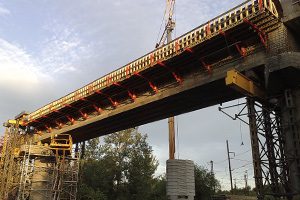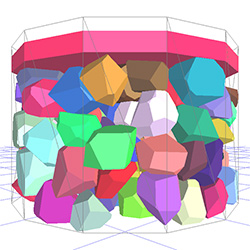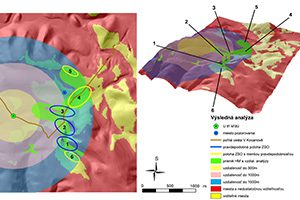Research program No. 2 designated as “Development of advanced structures and technologies” covers several related thematic areas. The main objective of the program is the design of Advanced Structures and technologies in terms of their increased reliability, durability and economy throughout the lifecycle. In the field of technologies the program aims to develop effective methods in the diagnosis of structures, identification and quantification of the influences acting on the building, construction design and technologies in the field of the environment (e.g. water and waste management of cities and municipalities).
Research groups
- Structures and Traffic Constructions
- EGAR – Environmental and Geo (Geotechnics and Geodesy) Applied Technological Research
- Mathematical Modelling
 Structures and Traffic Constructions
Structures and Traffic Constructions
This research group focuses on:
- complex structural-technical, material and static survey of wooden, masonry, concrete and steel structures, full-scale testing,
- analyses, reconstruction designs, rehabilitation and revitalisation of all types of building structures including bridges,
- experimental verification of the actual action and load capacity of ferroconcrete structural elements made of advanced materials,
- analyses and long-term evaluation of pavement surfaces and structures, pavement diagnostics,
- research and development of new materials and full-scale testing of pavement structures,
- determination of traffic flow characteristics, transport and pedestrian modelling, design of safety improvements of roads, modelling of fire spread and fire safety of building and transport structures,
- modern and effective railway constructions and the environment,
- testing furnaces for testing of building products and constructions at extreme stresses.
EGAR – Environmental and Geo (Geotechnics and Geodesy) Applied Technological Research
This research group focuses on:
- Urban Engineering – waste water and drinking water handling technologies, waste disposal technologies, solutions for interdisciplinary relations of buildings and a region
- Energy Diagnostics of Buildings and Regions “Smart Regions” – optimization and making energy flows in regions, territorial units and structures more effective
- Geotechnics – properties of geo-materials and their mechanical behaviour in interaction with geotechnical constructions; utilization of geothermal energy from geological environment
- Geoinformatics – geodetic, photogrammetric and metrological support for building activities and research
- Applied Modelling and Data Processing – mathematical modelling and numerical simulations of natural phenomena and processes; data flow processing, data standards and information modelling
- Utility Lines – solving the problems of designing, measuring and evaluating the technical condition of utility lines
 Mathematical Modelling
Mathematical Modelling
This research group focuses on:
- Analyses of load-bearing structural systems:
– Support for experimental verification of the properties of building structures by using modern simulation methods allowing a significant reduction of the necessary number of simulations,– Theoretical verification of the properties of building structures with help of analytical or numerical solutions using the finite element method and other methods.
- Support for designing constructions using interdisciplinary procedures:
– Simulation methods,– Optimization of structural design by deterministic and stochastic approaches.
-
Carrying out calculations and simulations:– Mathematical modelling of structural details, elements and components,– Simulations of structural stresses using experimental data,– Simulations of extreme stress of structural elements,– Statistical simulations and evaluations,– Modelling of selected technological processes,– Processing of data from „In situ” measurements.
-
Development and verification of new methodologies:– For verification of practical applications in terms of durability analyses,– Improvement and application of the integral method for complex analyses of cement composite elements.



